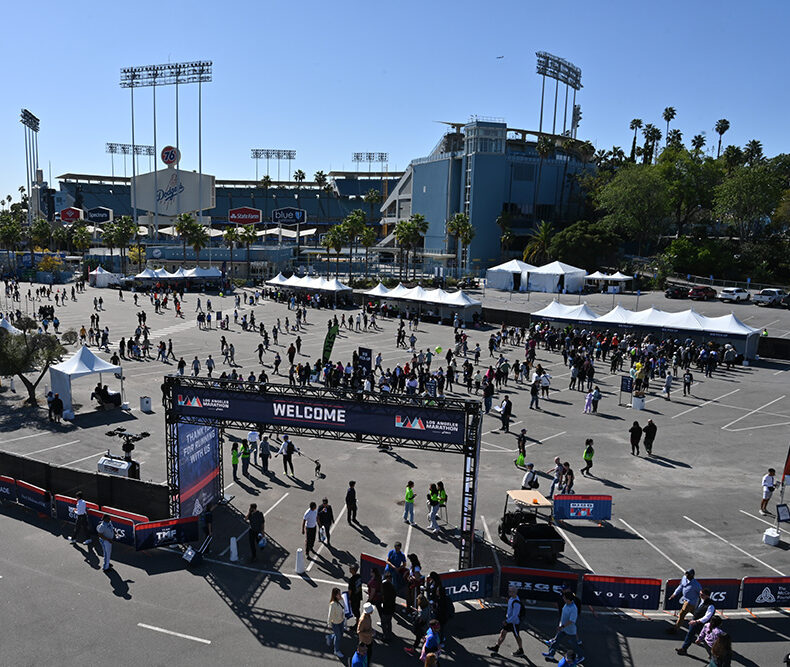Part of the concept of a “dress rehearsal” week for a long training run and eventually a race is becoming familiar with the our race preparation script and the modifications we’ll need to make in our lives for that week, the adjustments that we’ll need to make to our script due to the responsibilities in our lives, realizing that we’ll have additional temporary stress introduced into our lives, and yet still put ourselves in the best position possible to wake up early on those Saturday mornings or on race day and effectively crank those distances out.
We have the ability to block out all of the things that didn’t allow us to have a perfect week of preparation, and then on the day of our runs we’ll still revert back to our training to string together one good mile after another continually until we reach the finish line. In essence, the dress rehearsal week is about planning out perfection, but also realizing that perfection is unobtainable due to many things beyond our control and figuring out ways to make the best of things with adjustments and adaptations, and then still finding a way to run those distances to the best of our abilities.
With all of that mind, if possible, please take the time to plan out the week of February 19-25 to prepare for that 20-mile training run. For example, what will we eat that week, especially the final three days before the run? We most likely want to eat highly nutritious foods that are easily digestible and are known to agree with our digestive systems. We want to maintain a diet that’s individually balanced for us, and that has a different meaning for each person. We don’t want to forget protein in our diet during those days leading up to those runs, our diet cannot be too far weighted towards carbohydrates, and in fact “carbo-loading” can be taken way too far to the point of becoming self-defeating.
We all get our protein differently based on our individual diets, but in general, we probably want to avoid heavy foods as the source of protein, they tend to take a long time to digest. We want to keep in mind the timing of our meals and how long it takes our bodies to fully digest our meals before our runs. Most importantly, what exactly will we eat the day before the runs and for breakfast on the morning of those runs? At this point in the season, we should have a general idea of what works for us, and those last two training runs will be where we take those general ideas and refine them and then execute them to the best of our abilities.
Hydration during the days leading up to those runs will be very important towards preparing ourselves. We don’t want to overdo our hydration, but we want to make sure that when we start our runs and races that we’re not doing so already slightly dehydrated. We want to put ourselves in the best position possible before we start, and starting it already slightly dehydrated will only make things worse for us as we get deeper into the runs.
We’ve mentioned before many times that we’re humans, we’re not camels, we’re physically unable to load up on enough water the night before to last us 20+ miles the next morning. Hydration for long training runs and full marathons starts approximately three days before. Optimally, in the three days beforehand, we want to finish each day adequately hydrated, and not overly either, but reaching the hydration sweet spot that we each have, and that amount will be different for each person, it’s a simple question without an easy answer.
What time should we try to sleep in the days leading up to those runs? In general, we want to sleep as much as possible. However, we need to keep in mind that most people do not sleep very well the night before a race. The night before can be an anxious time, and then we usually need to wake up much earlier than we normally do, so it can be a disruptive night of sleep. Therefore, the night that we may want to focus on for a good night of sleep is two nights before the race.
For example, if the race is on a Saturday morning, then we may want to focus on Thursday night for a good night of long, restful sleep, because we may already plan ahead that Friday night will be disruptive to our usual sleeping pattern. For Friday night, just try to get in as much sleep as possible, however possible. Whether these adjustments include sleeping earlier, taking a nap if possible, etc., we would like to head into a long training run or a race with good sleep leading into it.
Finally, the day or night before, we want to prepare and set aside our clothing and equipment so that we don’t have to do much thinking or scrounging around trying to find things on the morning of our long training runs and races. For certain, on a 20-mile training run, it would be optimal to wear the exact same clothing, shoes, and equipment that we plan to wear for an upcoming race. We want to prepare our hydration bottles, belts, and vests, and fill them with our snacks the night before, and also pack a bag for our post-run needs with snacks, hydration, more comfortable footwear, a jacket or sweatshirt to keep warm, etc.
A possible schedule could include mapping out the following items with your personal details for a Saturday long training run or race:
WEDNESDAY
Breakfast
Lunch
Dinner
Hydration goals (fluid ounces)
Mid-week exercise/run duration and/or distance
Sleep time
THURSDAY
Breakfast
Lunch
Dinner
Hydration goals (fluid ounces)
Mid-week exercise/run duration and/or distance
Sleep time
FRIDAY
Breakfast
Lunch
Dinner
Hydration goals (fluid ounces)
Prepare and set aside running clothes, shoes, equipment
Sleep time
SATURDAY
Wake-up time
Breakfast
Hydration
Training run/race travel time
Training run/race start time
Finally, please plan ahead with the snacks and electrolyte products that you will bring with you to the 20-mile training run, and also to your full marathon race. The day of a race is not the time to try something new, running a marathon is a horrible place to discover that a new gel doesn’t agree with your digestive system.
For the race, you only want to eat and drink things that are time tested to work for you and are already known to be agreeable with your digestive system. The final 20-mile run is our last chance to test out those products before a full marathon race.
Finally, don’t forget the importance of replenishing electrolytes during our 20-mile training run and during a full marathon race. We’re losing a lot of electrolytes through our sweat as we continually run for almost 4 hours at our pace to cover 20-miles, and almost 5 hours to cover 26.2-miles. And as we explained before, common electrolyte products such as Gatorade or Powerade do not usually contain enough electrolytes per serving for our needs as endurance athletes. We’re pasting a video link below as a refresher on the importance of replenishing electrolytes for long-distance runners.
If we can do these things for final 20-mile training run, then when we get to our races, we’ll have this script or schedule ironed out already, and race week will feel like it’s simply an extension of our training.





